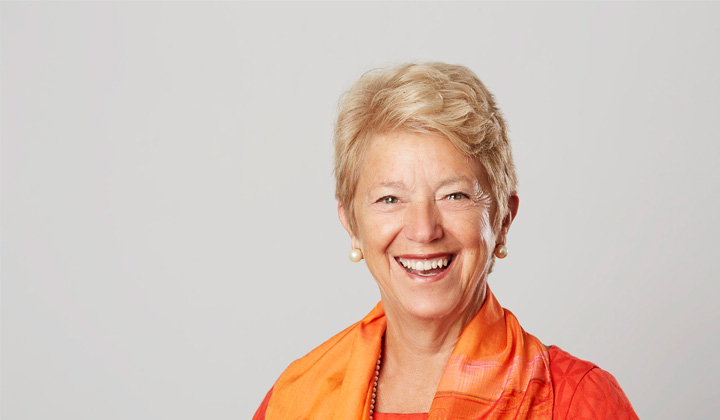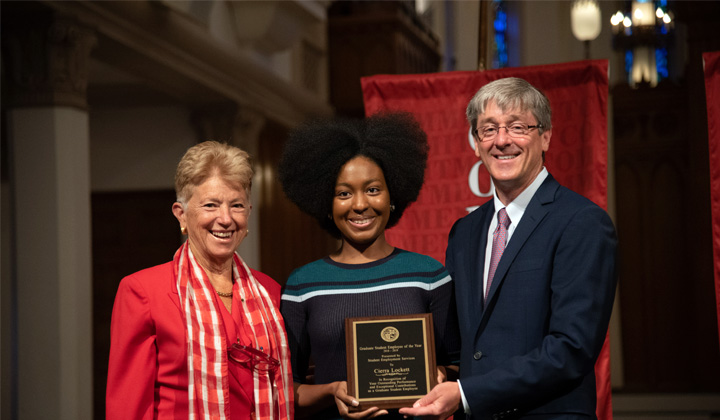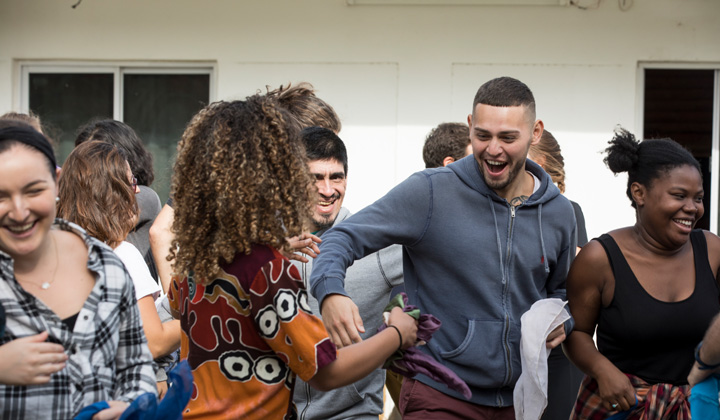A Message from Elena Bove, Senior Vice President for Student Affairs

Senior Vice President for Student Affairs Lane Bove has been passionately involved for more than 30 years in the education that occurs outside the classroom to enhance students' engagement in the full collegiate experience. Here, she reflects on a few highlights from the past year and how donor funding has supported some of Student Affairs key areas and established new ones.
In Student Affairs we help students discern who they are, who they want to be, and then help them become their best selves. It has become obvious, as higher education has evolved over the years that fundraising has to be part and parcel of what Student Affairs does if we want to stay current and respond to the ever-emerging needs of our students. It has only been in the last 10 years that we have begun to focus our energy on fundraising, and what an amazing 10 years of accomplishments – made possible by donor support. One of them is the Center for Student Collegiate Recovery, which has allowed us to more fully respond to students who are dealing with recovery and rehabilitation. During COVID-19, the center has been critical for students who have issues with substance abuse disorders and isolation; this has been a markedly difficult time for them. The center has been able to keep outreach going and be supportive, helpful, and engaged with these students.
Another instance where a donor came forward to help us establish a new program is Esports. The Esports Center within the Burns Recreation Center has been critically important for our students, particularly during COVID-19, as it has allowed our gaming students to be in community during these challenging times.
The LMU Food Pantry is another area that would not exist if it were not for private funding. We have students who are food insecure, and it has been a real mainstay for them during the pandemic. It is interesting that the areas where we have had significant private support in recent years have really been key areas of support during this time of COVID-19. In fact, much of the private giving this year has been to support students and families affected by COVID-19.

There have been dozens of other initiatives we have been able to build, develop, and support through the generous giving of private donors, families, and alumni - notably the Drollinger Field, which was our first significant donor initiative. Some of our most significant support has gone to our most vulnerable and/or underrepresented populations, including our Guardian Scholars Program (for current and former foster youth), Veteran Student Programs, the Undocumented Student Emergency Fund, Student Health Services, Student Psychological Services, Jewish Student Life, and especially the formation of Muslim Student Life. The support for these programs, and many others, during this global pandemic, has been particularly humbling and we are grateful for our benefactors’ generosity.
With our recent success and momentum in fundraising, we have recently turned our efforts to new initiatives. When Peg Dolan, R.S.H.M., was on campus working with students and staff in Student Affairs and Campus Ministry, she often spoke about our goal at LMU “to graduate students with intelligent hearts and compassionate minds.” For me, that is what the Center for Service and Action (CSA) seeks to enliven. It emboldens the heart and mind so that we are able to look at the world and understand that we are all part of something bigger than ourselves. CSA, under Pam Rector’s direction, encouraged everyone to see the other, to understand that we are all in this endeavor called life together. Pam’s approach to service was getting students to be with and for others. Pam’s goal was to have students become part of the communities they served and to approach service with a lens of mutuality and not salvation. It was really about learning the community, the people, and their needs, so that our students could then be with them to help create lasting change.
In my view, the CSA is really one of those places on campus where the rubber hits the road regarding mission. It provides opportunities and experiences so students can be transformed. I love this quote from Peter Hans Kolvenbach, S.J., “When the heart is touched by direct experience, the mind is challenged to change.” CSA provides the kind of experiences that allow students to see the world through a new lens. Our newest endeavor to endow CSA in honor of Pam Rector will allow us to build capacity and expand services for all of the various areas under the CSA umbrella.
Following the successful fundraising campaign for CSA, my top priority will be to secure a $2 million endowment for The Learning Community (TLC@LMU). From my view, one of the strongest programs we have for our Black students on campus is TLC. TLC really is about Black excellence and leadership. In its 20 years, the experience for our Black students, and more importantly, for the university as a whole, has changed dramatically and positively. When we first developed TLC, the ultimate goal was to empower our Black students to inhabit and invigorate LMU as their university, and for the university to take responsibility and accountability for the experiences of Black students at the university. The goal was Black achievement, Black success, and Black excellence to ensure support, inclusion, and equity.

Currently, TLC is a three-week, on-campus program for a cohort of students that begins before fall semester and continues throughout the year. An endowment for TLC would allow us to build capacity and allow more students to engage in the program. Right now, TLC has resources for about 30 students, even though we have approximately 100 first-year students who self-identify as Black or of African descent. I would like to open TLC to whomever would like to join; however, TLC is a very high-touch program that costs a lot of money. I’d also like to support our students for more than just their first year, making TLC a four-year program.
One of the things Rev. Albert P. Koppes, O.Carm., used to say all the time is, “what we need to do tomorrow is do what we do today, better.” As one of his students and mentees, I have taken that goal to heart. It is about the magis. How do we do what we do today, better? How do we build greater capacity, how do we engage our students more effectively, how do we help our students discern who they are and what they’re good at, and how can we help them become their best selves? The goal of Student Affairs is to engage our students and help them move forward. Certainly, 10 years ago, I would not have had recovery on my list, but it became apparent that it was exactly what we needed if we were going to help a particular segment of our student population. Different needs present themselves as we work with students and, as our campus becomes more diverse, there are more programs that need to be established. I can’t tell you today what that will be five or ten years from now, but as long as our goal is to meet the needs of our students and help them become persons who will transform our world, we will develop those programs. Just as our generous donors have come forward to help us create new areas on campus like the Center for Service and Action, The TLC@LMU Program, Center for Student Collegiate Recovery, and the LMU Food Pantry, I know future programs will be made possible because of their visionary support.
To support Student Affairs, visit here.